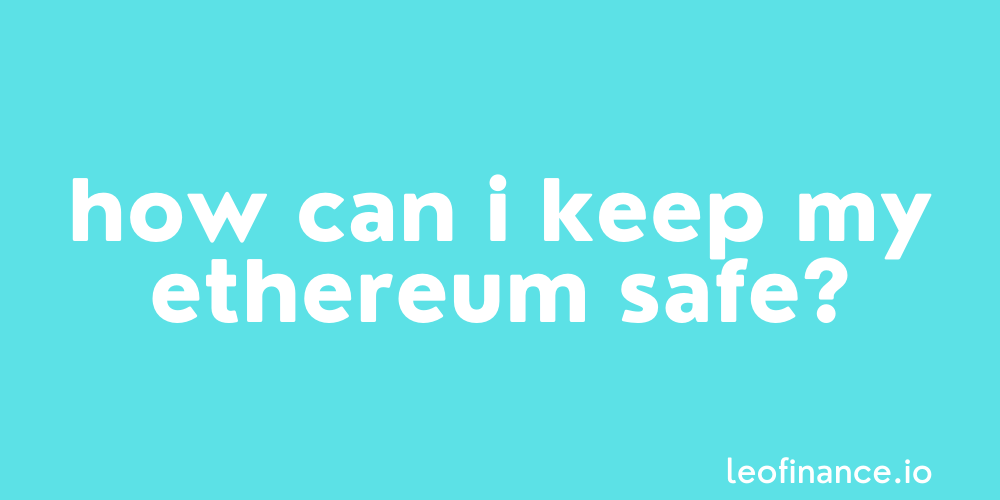
You can keep your ETH safe in a number of popular Ethereum wallets.
ETH can safely be stored using either hot or cold wallets.
The trick however, is understanding what you need to use your ETH for and how much day-to-day access you require to your coins.
In this section of the Ethereum guide, we go over the best Ethereum wallets for each use case.
The best Ethereum wallets
Unfortunately, there is no single Ethereum wallet that is best for everyone.
The best Ethereum wallet will come down to how you want to use your ETH.
For this reason, we’ve split this section of the guide up between active spenders, long term investors and day traders.
1. If you want to actively spend ETH
Are you an active user of the Ethereum blockchain?
This includes actively interacting with dApps built on Ethereum, such as the various Defi platforms and games.
MetaMask:
If you want an easy way to spend and send Ethereum via your browser, then MetaMask is for you.
MetaMask is an Ethereum wallet attached to a browser plugin.
It allows you to store and quickly use your ETH, as well as any other Ethereum based ERC-20 tokens you may have.
The wallet also allows you to safely connect to and interact with any Ethereum based dApps, all from your web browser.
In the simplest terms, a MetaMask wallet allows you to make Ethereum transactions through regular websites.
2. If you’re a long term investor
Maybe you’re actually just a long term investor who simply wants to store their ETH in the safest way possible?
If you don’t need fast access to your ETH and want the safest solution, then cold wallet storage is the solution for you.
Cold storage refers to an Ethereum wallet that is not connected to the internet.
The most common type of Ethreum cold storage device is an encrypted, portable device that stores your private keys offline and gives you access to your balance.
While you must transfer funds to a hot wallet in order to trade, you alone are responsible for your balance by having full control of your keys.
You can see that cold storage is a more secure option.
But Ethereum cold storage wallets are also less convenient, not to mention being expensive, with a good cold storage device costing in excess of $100 USD.
Best Ethereum cold storage devices:
- Trezor
- Ledger Nano S
3. If you’re an active trader
Lastly, maybe you’re an active day trader who requires the constant ability to trade your coins?
If you want to trade in and out, then use a hot wallet from your crypto broker of choice.
Put simply, Ethereum hot wallets refer to an address that is connected to the internet.
The Bitcoin stored in your broker's account is the most common type of hot wallet.
But if you’ve read any of our guides, you’d be familiar with the phrase "not your keys, not your crypto".
As your Ethereum wallet simply holds your private keys rather than physical coins, you’re essentially lending your crypto to the exchange.
When using a hot wallet, you are no longer in control of your private keys, so you’re no longer in control of your Ethereum.
Ethereum hot wallets offer the advantage of being accessible and making trading Ethereum easy as a few clicks on the crypto broker's platform.
In contrast, hot wallets require you to trust a third party with your keys.
A huge price to pay for convenience.
Best crypto brokers:
- Binance
- Bittrex
Final thoughts on keeping your ETH safe
You should only be leaving as much ETH in your hot wallet as you need to trade or transact within the extremely short term.
While you technically still control the private keys to your MetaMask wallet, the same could be said here because of other associated dangers with using a browser plugin.
The safest option for storing your ETH is as always, keeping them stored on a secure cold storage device.
While you lose the ability to potentially earn from Defi, cold storage is by far the safest option for your core investment.
Best of probabilities to you.
Direct from the desk of Dane Williams.
Why not leave a comment and share your thoughts on how to keep your Ethereum safe, within the comments section below? All comments that add something to the discussion will be upvoted.
This Ethereum blog is exclusive to leofinance.io.
Posted Using LeoFinance Beta
Thanks for explaining the detailed differences in when to use which wallet! That is very useful.
Posted Using LeoFinance Beta
No problems Hetty.
In the end, you've just gotta figure out how you want to use your ETH and then choose accordingly.
Posted Using LeoFinance Beta
I like how you explain it in detail, I for example use metamask as a daily wallet and some shitcoins in the long term.
Posted Using LeoFinance Beta
That's pretty much the same as me.
I don't have a lot of ETH as part of my long term investments, so don't need to put it onto a cold storage device.
As a result, I just have a small amount in my MetaMask wallet to do some small dApp related transactions here and there when required.
Posted Using LeoFinance Beta
Then same or me, i only have a small amount of BNB for transsactions.
Posted Using LeoFinance Beta
Hi, im a new b, thanks, this was insightful.
Posted Using LeoFinance Beta
Hey and welcome to LeoFinance!
I see that this is the first comment that you've left here in the community which is pretty cool.
Can I ask how you heard about LeoFinance and what brought you to this particular blog?
Hopefully we'll see you leaving a few more comments around the place and maybe even writing some blogs of your own some day :)
Posted Using LeoFinance Beta